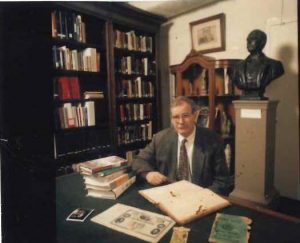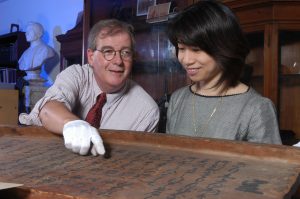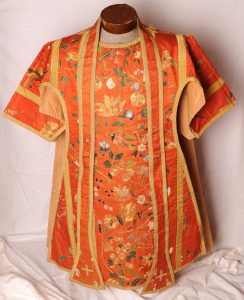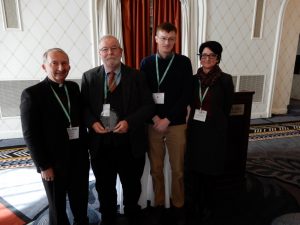This semester, we said goodbye to Dr. Timothy Meagher, University Archivist and Curator of the American Catholic History Collection at The Catholic University of America. In addition to his service as University Archivist, Meagher was Associate Professor with the Catholic University History Department, where he regularly taught Irish-American and immigration history. Though we will miss him at the Archives, we know he will be happily plugging away at his magnum opus in his “retirement”: a comprehensive history of Irish America.
Provenance is a word archivists love. It refers to the origin of a collection of archival materials, yes, but embedded in those origins is identity. For this reason, archivists use provenance as an organizing principle for their records and collections. In other words, we try to maintain and organize materials as faithfully as we can to the intention of the original creator and/or organizer of the collection, in order to preserve the integrity and identity of the collection itself.

Meagher’s own origins are manifest in his career. Certainly, his own Irish and Catholic ancestry inspired his study of Irish America. But he also occupied a unique position as both an academic historian and a public one. While completing his Ph.D. in history at Brown University in the early 1980s, he taught history in his hometown of Worcester, Massachusetts. But after four years, that job ended and he found himself unemployed. “There were no historian jobs,” he says of the time. So he improvised. There was a position as Assistant Archivist at the Archdiocese of Boston Archives. “Jim O’Toole was there, a historian himself getting a Ph.D. from Boston College.” The two formed a lasting friendship, with O’Toole becoming a prominent scholar of both archival practice and American Catholicism and who in fact, has served on our archives’ advisory board since its inception in 2002. For Meagher’s part, he saw that there were potentially multiple uses for the skills of a historian.


In the late 1980s, Meagher made his way from Boston to Washington, D.C., where he had years earlier graduated with his Bachelor’s in History from Georgetown University. His interest in public history was now heightened by both his work in archives and a concurrent rejuvenation in the museum field, especially in the area of exhibition and public programming. He speaks fondly of his work with the National Endowment for the Humanities, where he served as Program Officer until accepting his post at Catholic University. The NEH required those who worked in public history institutions to work directly with relevant scholars in the academy, “we had historians and museum people coming in and evaluating the quality of the exhibits we funded—there were some great conversations.”
Having spent seven years making humanities scholarship accessible to broader audiences, Meagher decided it was time to move on. He was particularly interested in the museum collection at the University Archives when he began working here in 1997. From the start, his primary mission was using the archival materials in our collections to teach history to a variety of audiences. “There was a move within the Catholic Church at that point to save material culture.” At the time, few in the field of Catholic archives knew much about preserving sacred objects, so Meagher organized the Saving Sacred Things conference in 1999 to address the matter.

Drawing from his experiences working with professionals in a range of cultural institutions, Meagher expanded the Archives’ outreach and educational programming dramatically. “I was aware that there were other places doing public outreach in archives. I knew people at NARA [National Archives and Records Administration] and other places who put together educational packets using their archival materials.” So he worked with staff and teachers to put together packets related to a variety of aspects of Catholic history for Catholic high school students with materials from our archive. These formed the basis of the now fully digital American Catholic History Classroom an online education site featuring hundreds of digital documents, photos, and teaching resources. “We were trying to teach young people how historians solve historical problems. To look at source material and figure out what happened. We tried to do it with this material related specifically to Catholic life. No one else was doing it on a broad basis. A whole dimension of American life, we wanted to fill it with good history. Our collections lend themselves to understanding national Catholic history.”
Today, the Archives’ outreach and educational programming is thriving. Thank you, Professor Meagher!

I am often to blogging and i really appreciate your content. The article has really peaks my interest.
Now going to bookmark your site and keep checking for new information.
Signs your cold is getting better